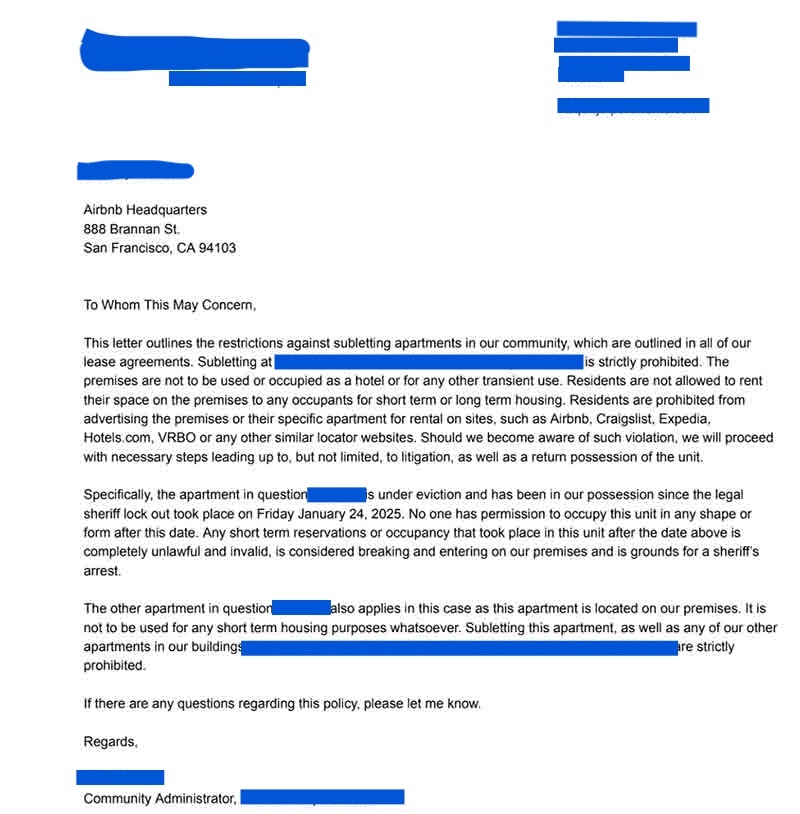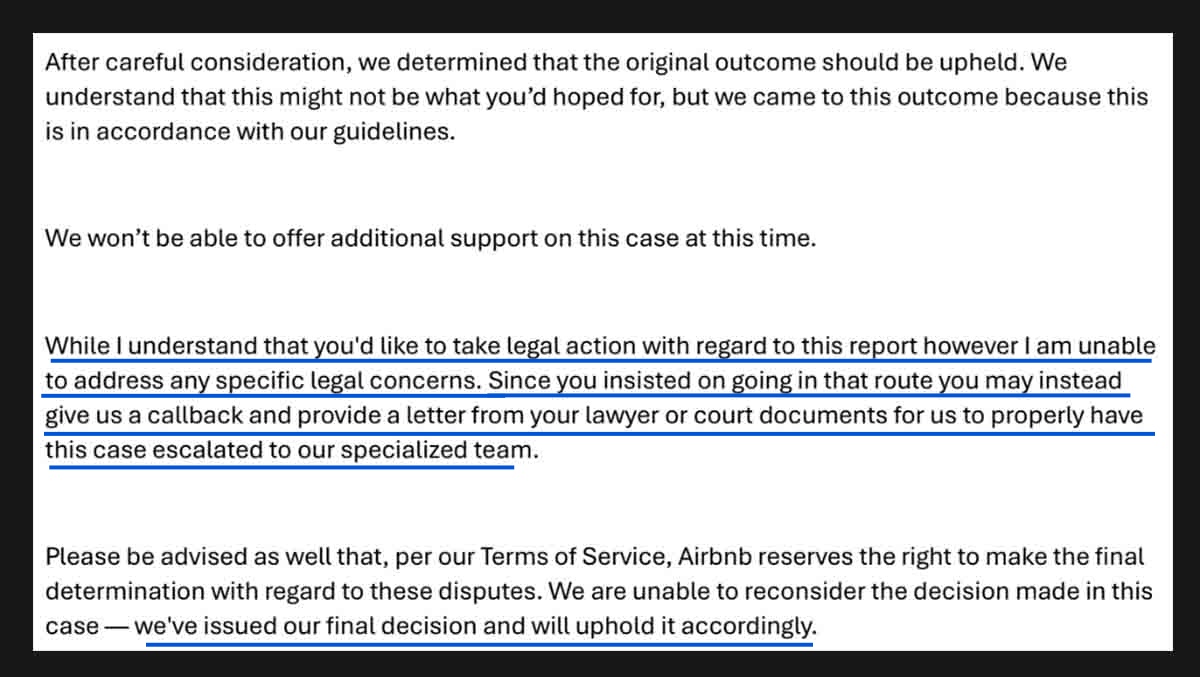Published: Updated:
The recent LA wildfires temporarily displaced Rahul Kapur’s family and pets from their home. The Kapurs temporarily relocated to an Airbnb rental in nearby Marina Del Rey. They reserved the unit for two weeks and hoped to return home after their stay. But as the fires continued to burn, it became clear that wouldn’t be possible.
They were displaced again when that apartment wasn’t available beyond the original contract. However, the good news came when an Airbnb rental in the same condominium became available. The family migrated to the new unit and settled in.
Kapur and his family are still reeling from what happened next.
On the fourth day of their stay, they heard keys rattling in the door. Suddenly, several people walked into the condo without warning. They identified themselves as building management and informed Kapur that he was occupying an illegal Airbnb rental. These unfriendly officials told the group to gather their belongings and leave immediately, or the sheriff would come and escort them out.

The Kapurs were evicted from the illegal Airbnb rental like common squatters, paying $3,400 for the traumatic experience. But worse than that was the response of Airbnb ambassadors (customer service) when Kapur asked for help.
Airbnb agents only agreed to refund the unused nights after the family’s eviction from the illegal rental. Kapur’s refund request for the entire rental fee and reimbursement for the last-minute hotel stay was refused.
Now, weeks later, Kapur is asking Consumer Rescue for help. He finds Airbnb’s response to his family’s “traumatic eviction” to be uncaring, dismissive – and unfair.
I agreed. But after digging a little deeper, it seemed clear to me what likely went wrong with Kapur’s request.
Here’s his family’s awful tale and what an Airbnb guest can do if faced with a surprise rental eviction.
Wildfires cause a mass exodus in LA
Kapur and his family, like many others, were forced out of their home by the raging wildfires in January. Their rehousing was particularly difficult because they had pets in their caravan.
“We found a place, and I booked it, but it wasn’t available for the entire time we needed,” Kapur told me. “I didn’t think the fires would be cleared in two weeks, so I booked another Airbnb rental. It turned out to be in the same building.”
The original rental, spanning two weeks in early January, went off without a hitch. The second Airbnb rental was a different story entirely.
A surprise eviction notice from this Airbnb rental
On the fourth day of the Kapurs’ stay in the second Airbnb rental, the family was relaxing by the TV when they heard someone fiddling with the door.
Before we could figure out what was happening, strangers appeared inside. It was shocking. They said they were building management and we had no right to be there. According to these people, the sheriff had evicted the previous tenant a few days earlier, and no one had the authority to list the apartment for rent.
To prove this true, one of the managers handed Kapur a letter that she said they’d already sent to Airbnb. According to the document, none of the units in any of the buildings in the condominium complex can be legal Airbnb rentals.
“Of course, we left right away. We didn’t want any involvement in this nonsense,” Kapur told me. “We gathered everything, and I booked the local Marriott hotel.”

Where is that Airbnb refund for the illegal rental?
For the next several nights, the family stayed in two hotel rooms at a nearby Marriott. The quarters were tight, but at least they didn’t have to worry about getting evicted. However, at over $300 per room per night with taxes and resort fees additional, Kapur was looking at a $3,200 invoice at the end of their stay. He’d paid $3,400 for the illegal Airbnb rental, and he was counting on that refund to cover the hotel bill.
But when Airbnb sent him notification of its proposed resolution, Kapur was once again stunned.
An Airbnb agent explained that the company had tried unsuccessfully to negotiate a refund from the “host.” That host had declined.
Yes, you read that right. Airbnb asked the person who had been illegally listing a property for rent on its platform if he would refund his evicted guests. Not surprisingly, that person who himself had been evicted from the unit, refused to return any of Kapur’s rental fee.
On the bright side, the Airbnb agent continued, AirCover would provide a partial refund of the fees Kapur had paid for the illegal rental. In a message that sounded like a lot of AI-gobbledygook to me, an unnamed Airbnb representative gave Kapur the final resolution:
Upon further review, you have reported the building management from your previous stay with your host ***** informed you that the listing you were staying in was evicted[sic]. Airbnb already made an action to this report and was able to notify your host regarding the captured violation and following process based on our policy.[sic]
Based on the investigation with our team, you checked out last January 29,25 [sic] from your host place. Your original check out was last February 1,25 [sic] for 7 nights. Your reported issue was eligible for a 30% refund for the 4 impacted nights and full refund for the 3 unspent nights based on our AirCover. The total refund: $1,690.
Airbnb representative issuing the final resolution
Kapur was understandably furious, leading him to make some missteps in his continued quest for Airbnb to make his family whole after this fiasco.
Legal threats and an unreasonable compensation request
Despite what the Airbnb agent told Kapur about this being the final outcome, he wasn’t about to accept this “final resolution.”
Next, he sent a letter to Airbnb and threatened legal action. He asserted that Airbnb had placed his family in danger by listing an illegal rental on its site. Now, he wanted a full refund for not just the second unit the family was evicted from but also the $5,369 he paid for the first apartment.
Not surprisingly, Airbnb rejected this request and reiterated the final offer. After reading through the paper trail, I was sure Airbnb would not communicate directly with Kapur again about this rental problem. As typically happens when consumers resort to legal threats, any further correspondence would be through Airbnb’s legal department.
Related: 7 simple ways to fix any consumer problem
For years, I’ve been warning consumers not to drop legal-threat bombs unless they’re prepared to follow through. Those words invariably backfire on frustrated customers. Companies almost always call the consumer’s bluff and send the case to the legal department to await the customer’s legal representation.
📬 Subscribe to:
Tales from Consumer Advocacy Land
Real stories. Real rescues. Real advice.
Join thousands of smart travelers and savvy consumers who already subscribe to Tales from Consumer Advocacy Land — the friendly weekly newsletter from Michelle Couch-Friedman, founder of Consumer Rescue. It's filled with helpful consumer guidance, insider tips, and links to all of our latest articles.

And that’s what happened here.

Asking Consumer Rescue for help
Realizing that his efforts weren’t getting him any closer to the refund he believed Airbnb owed him, Kapur had one more idea. He hoped the Consumer Rescue team could step in and advocate for his family.

After reading his request for help, I agreed that Airbnb hadn’t treated him fairly. However, his current request for a full refund for both Airbnb rentals was not, in my opinion, reasonable. His family had completed a two-week stay without incident at the first property. I didn’t believe there was any basis to ask for that money back. Even worse, I thought that part of the complaint weakened Kapur’s valid request that Airbnb make him whole after the eviction from the second rental.
I let Kapur know that I would not be able to mediate a refund for the first rental. However, I knew something had gone wrong in his situation. A “host” of an illegal rental should never be given the opportunity to decide whether or not to refund an evicted Airbnb guest. And since I noted that Airbnb removed the listing, it was clear the company agreed the rental was problematic.
It was time to ask our always helpful Airbnb executive team what was happening here.
Related: This illegal Airbnb rental in Las Vegas was a gamble this guest lost!
The good news: Here’s your refund
I sent the details of Kapur’s experience to Airbnb’s executive resolution team. They reviewed what happened to the family and the correspondence between Kapur and the Airbnb representatives, and they agreed with me.
Kapur soon had the good news he was waiting for.
In the end, Airbnb refunded the $1,690 it initially offered Kapur as its final resolution AND the $3,219 they spent at the Marriott hotel after their eviction.
Kapur is thrilled to have his family back in their home and to finally receive justice for their experience at an illegal Airbnb rental.
Warning signs your Airbnb rental might be illegal
It’s very difficult to know beforehand whether the Airbnb rental you’ve chosen is illegal. Local rental laws vary and individual building regulations complicate things further. But there are a few things you should check before you book a vacation rental.
- Does the city where you’re staying have any restrictions on Airbnb rentals? You can look this up by googling the name of the city plus “Airbnb rental restrictions.” You can also call the city’s town hall and ask.
- Are there reviews for the site? Illegal Airbnb rentals tend not to have any reviews. If your rental has reviews, read them carefully. Look for subtle clues that something might be amiss with the rental.
- Have you been given unusual check-in procedures? Being asked to come in the service entrance or to tell the doorman you’re a family friend of the owner are red flags. These requests are often a sign that the property isn’t approved for rental use. (see: Why did an Airbnb host ask me to pretend I’m not a guest?)
What to do if you’re evicted from your Airbnb rental
Airbnb is a listing site, not a management company, and doesn’t vet the vacation rentals. That means the properties you see on the Airbnb website have not been investigated to make sure they’re legal. Unfortunately, sometimes, a traveler will only find out that the property they booked is illegal after they arrive.
Because local laws are changing and making it more difficult for Airbnb hosts to rent their homes, some owners are going rogue. By ignoring the regulations and continuing to list their properties they’re putting their guests in precarious situations. Here’s what you need to know if you end up in an illegal Airbnb.
Gather your things and leave the rental
If management comes knocking on the door of your Airbnb rental with an eviction notice, it’s time to go. Showing that you have a contract from Airbnb is not going to override local laws or regulations.
Contact the host and the Airbnb resolution center
You’ll want to document that you alerted the host of your eviction from the rental. But even if the owner tells you the vacation rental is legal, as Kapur’s did, you should still leave. You don’t want to be in the middle of a dispute between building management and an Airbnb host. That’s no way to spend a vacation or an emergency placement as was the case with this family. Let Airbnb know you’ve been kicked out of your rental and ask for assistance to find an alternative property.
Find your own replacement property
If Airbnb is unable to find you a replacement rental, your next step is to find your own replacement property. Here’s where it can get tricky. You need to find a comparable property if you’re hoping for Airbnb to consider reimbursement for your troubles. That is to say, if your Airbnb rental costs $250 a night, you’ll want to find a hotel room in a similar price range. Of course, sometimes that isn’t possible – for instance, if there is a giant wildfire raging that has displaced thousands of people at the same time. But the idea is not to go overboard with your replacement property choice.
Keep your receipts
Make sure to keep all your receipts for your replacement property. Additionally, I’ve seen particularly friendly Airbnb agents offer displaced guests a small stipend for food and beverages. So keep those receipts as well. You’ll need to submit all proof of the costs of your eviction to Airbnb for consideration.
Keep your correspondence with Airbnb cordial, concise and clear
It is normal to feel angry, confused and even victimized in a situation where you’ve paid for an illegal rental that shouldn’t even have been listed on Airbnb. But always keep in mind that the complaints that receive the most favorable and swift outcome are ones that are:
- Cordial
- Concise
- Clear
Sometimes, consumers make the mistake of unloading their anger on the person who is taking their complaint. That’s a bad idea, so don’t do it. It’s best to try to stay neutral, keep your story short, and make sure you’re communicating the right facts. Always leave out extraneous details that don’t serve to provide clarity.
Ask for reasonable compensation
In this case, the reasonable resolution was for Airbnb to claw back any payments that it made to this “host.” Kapur should have received compensation that made him whole. That means his family should not have incurred additional charges above what they originally intended to pay for that week in Marina del Rey.
Related: Never claim to be nearly killed by an inflight injury if you weren’t. Here’s why
It is quite common for consumer complaints to get “overlooked” or ignored when a customer asks for much more than what they are owed. A critical part of successful problem-solving is to ask for a reasonable resolution.
The bottom line
Travelers can’t always predict whether an Airbnb rental is legally permitted or not. This is also true of Vrbo and other short-term rental listing sites. But what you can do is make sure you know what to do if you unfortunately find yourself in an illegal vacation rental.
And, of course, you always have the Consumer Rescue team on your side, ready to help. We fix problems. Our assistance is fast, friendly, and always free of charge. 🛟😊 (Michelle Couch-Friedman, Consumer Rescue)



